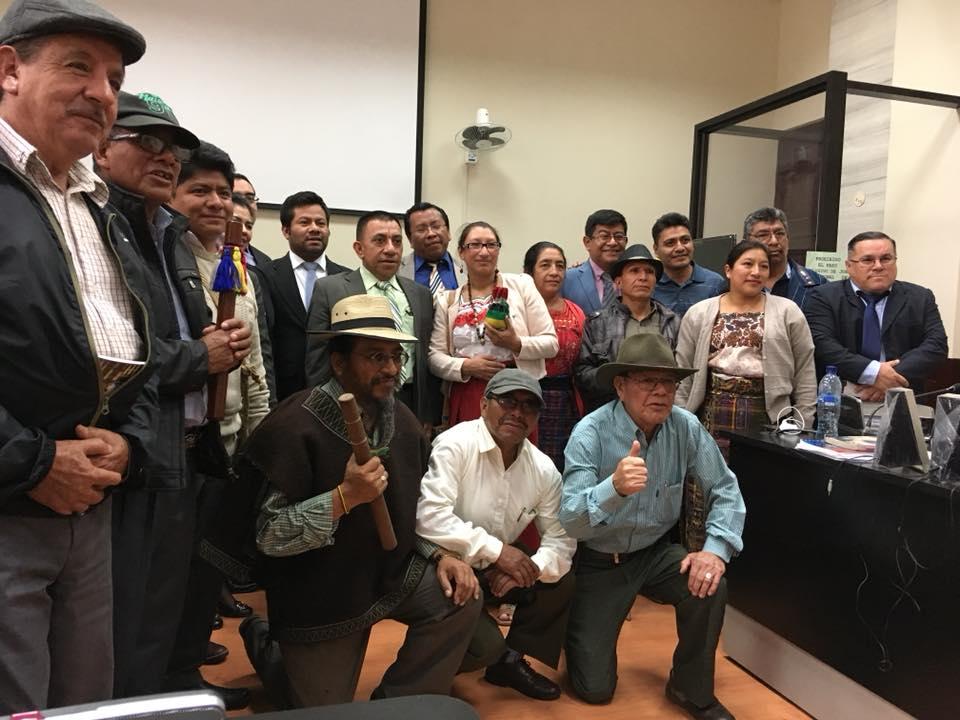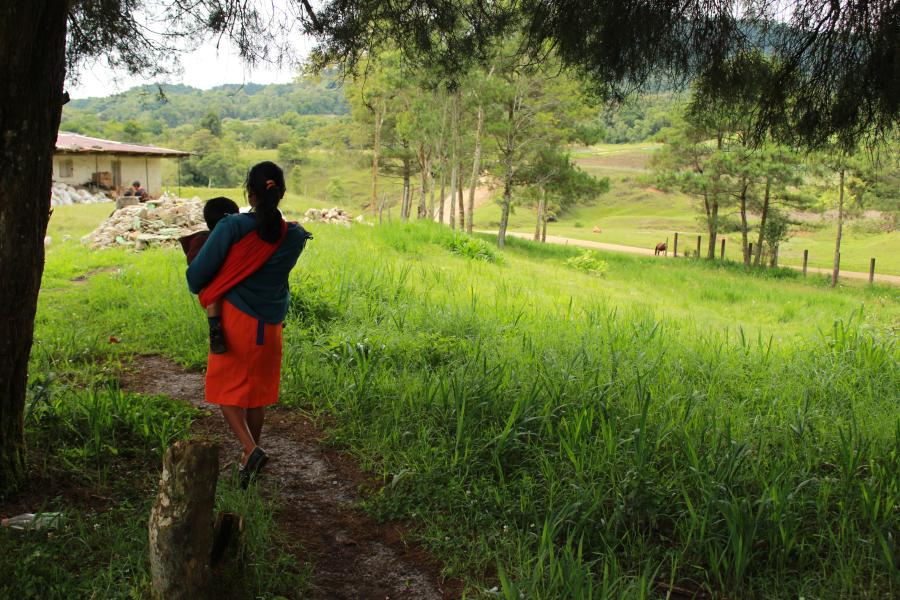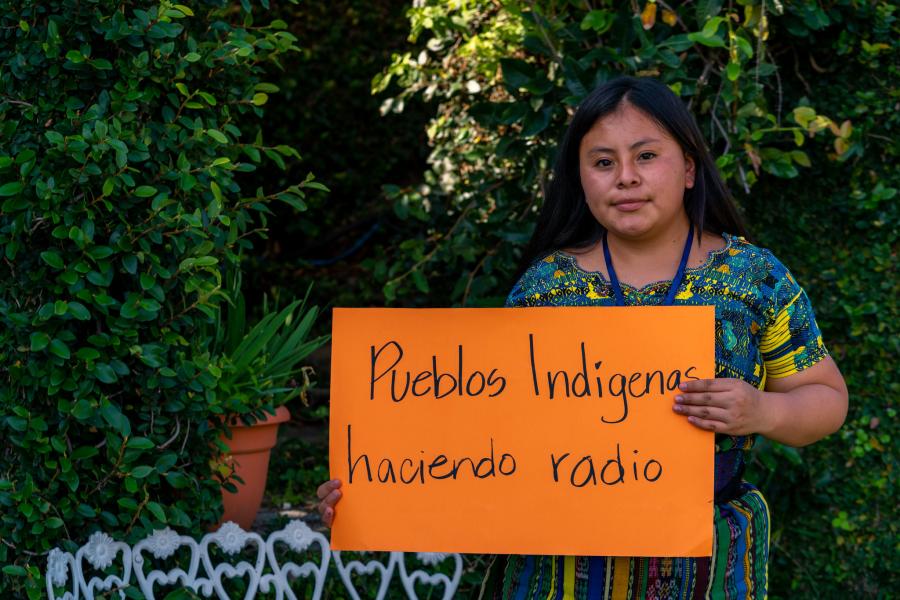
Photo: Human rights defenders from the Santa Eulalia & Santa Cruz Barillias areas of Huehuetenango, Guatemala gather together while celebrating the acquittal of Baltazar and 5 other rights defenders on July 31st, 2018. Each person in the photo had been previously charged for crimes that of which they were later found innocent. By Lisa Maya Knauer.
Alfredo Baltazar, a Q'anjobal Maya community leader from Santa Eulalia, Huehuetenango, has been acquitted of all charges after being criminalized with a slew of charges by the state of Guatemala. This ruling comes in the face of continuing criminalization of Indigenous rights defenders, human rights defenders, and environment defenders.
Baltazar, a member of the grassroots organization known as the Movimiento Social of Santa Eulalia, has advocated for his community around the world, bringing attention to the violence, environmental harm, and displacement caused by energy and extraction projects taking place in Indigenous territory. At the United Nations Forum on Indigenous Issues in May 2013, he presented on the repression of peaceful protest in Huehuetenango. Baltazar met with civil society members and decision makers across Europe in 2014, calling for “a local development strategy more in tune with the needs of local communities in Guatemala and the natural world.” Also in 2014, Baltazar was one of several community leaders who met with Guatemalan President Otto Perez Molina to discuss the extraction and energy projects taking place in Indigenous territory.
Alfredo Baltazar expresses his community’s deep connection to the land in the documentary ‘Territorio Q'anjob'al, vientre acosado’:
“We have been taught that Mother Earth is our mother, and that she has veins, she has a womb...just as we are, so is she. When they destroy her, it is like they are destroying our own biological mother.”
According to anthropologist Lisa Maya Knauer, five other rights defenders were tried alongside Baltazar, being charged with crimes mostly stemming “from the movements in resistance to the proposed hydroelectric projects in Barillas, and the unjustified arrests of community leaders from the community of Ixqusis (pronounced Eesh-ke-sees) in the municipality of San Mateo Ixtatan…” Their trial was postponed for months, but hearings were finally held on July 31st. In each, “the Public Prosecutor asked the judge to nullify the arrest warrants since they could not find sufficient evidence that any specific individual had committed most of the alleged acts.”
The allegations against Baltazar and the five other rights defenders were found by Amnesty International to be, “based on testimonies that only confirm the presence of these human rights defenders at said demonstrations, as well as their roles as community leaders,” and thus “insufficient evidence to substantiate the charges against them.” The judges of the case reportedly expressed concern that the charges were “based on incorrect information or conduct that does not constitute a crime,” and “reiterated all individuals’ rights to peacefully demonstrate, meet, and associate.” The ruling also provided the guideline that “charges cannot be leveled against an individual solely based on their participation in a demonstration or their belonging to an organization.”
This case highlights the criminalization crisis rights defenders are facing in Guatemala. UDEFEGUA reports that in 2017, there were 166 cases of criminalization against human rights defenders, and from January 1st to June 8th of 2018, there were 76 cases of criminalization. These instances are especially prevalent in the state of Huehuetenango, bordering on Mexico, with 105 of the 493 acts of aggression against human rights defenders taking place in 2017 occurring in the department. Indigenous people are especially vulnerable; 2014 date from Global Witness documented eight times more Indigenous human rights and environmental defenders killed for their work than non-Indigenous defenders.
The murder of Baltazar’s good friend and fellow Q’anjobal activist, Daniel Pedro Mateo, in 2013 demonstrates the immediate threat that these development projects have on Indigenous communities. Pedro Mateo founded a community radio station and was, “a leader in the community resistance to mining and hydroelectric activities in Huehuetenango.” He worked to oppose hydroelectric, mining, and logging projects in the area and many in the community believe that he was targeted for his environmental activism.
The charges against Baltazar and the murder of Pedro Mateo are part of a wave of violence and criminalization stemming from the interests of hydroelectric companies in the region, including Hidro Santa Cruz and Hidro San Luis. The Guatemalan government often prioritizes the interests of these companies over those of the local community, leading to the criminalization of the community and protection of the corporations’ property. As grassroots activism is criminalized, Indigenous groups have found success in working to terminate international financing of these projects through appeals to the international community.
In Huehuetenango, there have been some successes for grassroots activism against criminalization. In 2016, seven Indigenous community leaders were released from prison, five of whom being acquitted of all charges. Two of these leaders, Rigoberto Juarez and Domingo Baltazar, were arrested without warrant or charges while trying to file reports of human rights violations to the Department of Public Ministry and the United Nations Commission for Human Rights. While their release provides some justice, the harm inflicted by two years of incarceration, separation from families, inability to provide for their families, and the removal from their community at a crucial moment of social organizing, was not addressed in the ruling. These leaders deserve compensation for the aggression acted upon them and their communities.
While Baltazar’s acquittal is a victory, the economic, social, and emotional harm done by the false accusations against him and others must be recognized and addressed by the Guatemalan criminal justice system and government.


